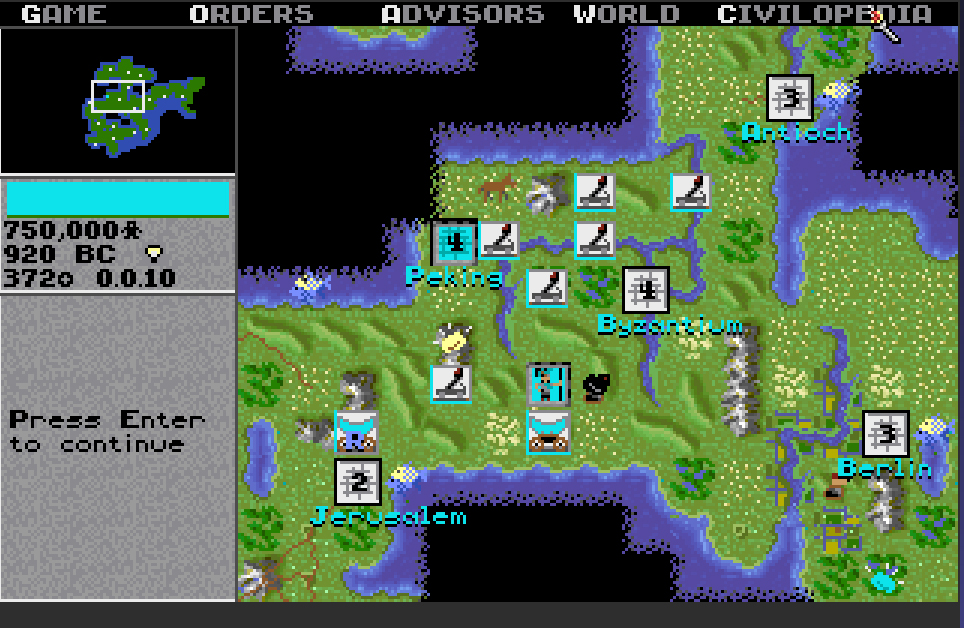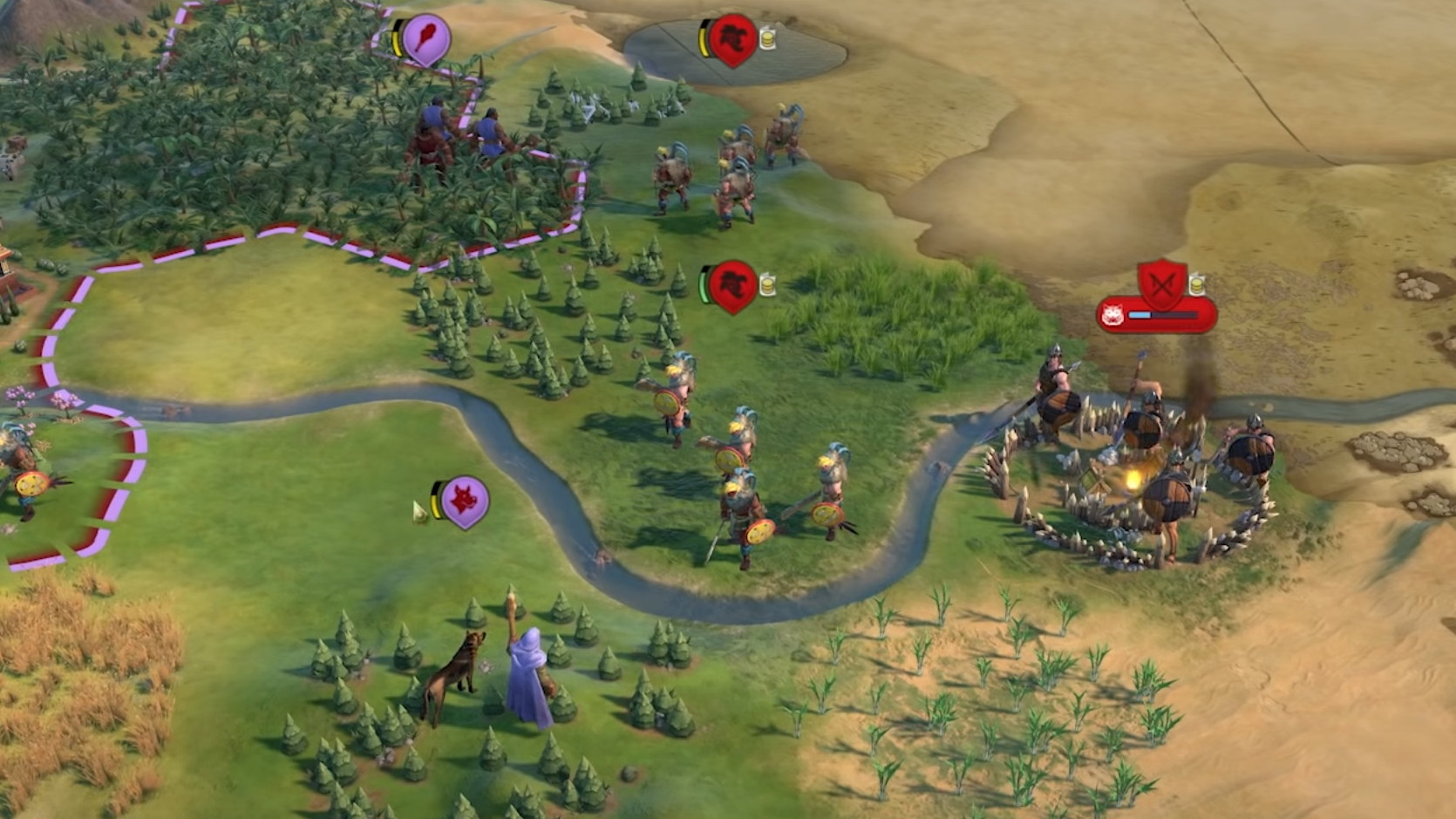PC gaming would look very different without Civilization
I have no idea where we'd be without Sid Meier's Civilization. Its influence has been an overwhelming constant for decades, defining generations of strategy games and developers. If Sid Meier and Bruce Shelley hadn't decided to let Napoleon, Montezuma, and Alexander the Great duke it out, swallowing up the world and dropping nukes on each other, a huge chunk of gaming history would never have happened.
Turn-based strategy existed long before Civ, but it's Civ's brand of turn-based strategy that became the model that most of the genre ended up following. It's not just 4X games that owe almost everything to Civ. You can't help but stumble across its DNA everywhere, whether you're playing Crusader Kings, Total War, or Age of Empires, which dreamed of being a real-time Civ.
It just kept setting the standard, over and over, with each new release. Wherever you are in the gaming timeline, there's a good Civ to play. Throughout almost my entire life, Civ's been there, beckoning me to take one more turn. And it's always recognisable. You always know what you're getting with Civ. That doesn't mean it's immune to changes, and each team has left their own mark on the series, but it always maintains that comforting familiarity.

Meier's name is still in the title and he continues to oversee the series to this day, which is why it can be hard to separate the individual games from Civ's long history. But it's not just Meier's legacy. Every single Civ has its own designer, and the team has changed over the years. Huge shifts have occurred due to their vision. And then each new designer builds on it, so that they're adding to this collaboration that's been going on for longer than a lot of its players have been alive.
Time portal
When you're playing Civ 6, you're also playing every Civ that came before it, and through all the changes that original design philosophy is still apparent
When you're playing Civ 6, you're also playing every Civ that came before it, and through all the changes that original design philosophy is still apparent. A focus on exploration and discovery has been with the series from the start, highlighting the achievements of humanity and not just the conflicts, and letting you win the game not just through conquest but by leaving Earth and travelling to the stars. It's ultimately an optimistic series, and that optimism proved to be infectious. Even Total War, a series all about huge armies colliding, lets you go down the diplomatic route, conquering the world by making massive alliances.
Civ might seem conservative 30 years on, but in 1991 it seemed wildly ambitious. Meier and Shelley's previous game was Railroad Tycoon, and the leap from managing a railroad company to being the immortal ruler of a global empire was pretty big. "We were young, and we had no fear," Meier told me in an interview a few years ago. It was an experiment. Things like using squares instead of hexes and making it turn-based instead of real-time weren't made right away, instead being born out of a desire to make this complex game more accessible.

Would I recommend the first game now? Maybe if you want a trip back through gaming's past. But you could instead play the much flashier Civ 6. Or, if you prefer squares over hexes, you can't go wrong with some Civ 6. And you'll still see what Meier, Shelley and Microprose were trying to create in 1991. Other developers are still trying to find their own Civs, like Mohawk Games' Old World and Amplitude's Humankind. At this point, the only way Civ will vanish is if actual human civilisation perishes.
from PCGamer latest https://ift.tt/3wfdAUv
I have no idea where we'd be without Sid Meier's Civilization. Its influence has been an overwhelming constant for decades, defining generations of strategy games and developers. If Sid Meier and Bruce Shelley hadn't decided to let Napoleon, Montezuma, and Alexander the Great duke it out, swallowing up the world and dropping nukes on each other, a huge chunk of gaming history would never have happened.
Turn-based strategy existed long before Civ, but it's Civ's brand of turn-based strategy that became the model that most of the genre ended up following. It's not just 4X games that owe almost everything to Civ. You can't help but stumble across its DNA everywhere, whether you're playing Crusader Kings, Total War, or Age of Empires, which dreamed of being a real-time Civ.
It just kept setting the standard, over and over, with each new release. Wherever you are in the gaming timeline, there's a good Civ to play. Throughout almost my entire life, Civ's been there, beckoning me to take one more turn. And it's always recognisable. You always know what you're getting with Civ. That doesn't mean it's immune to changes, and each team has left their own mark on the series, but it always maintains that comforting familiarity.

Meier's name is still in the title and he continues to oversee the series to this day, which is why it can be hard to separate the individual games from Civ's long history. But it's not just Meier's legacy. Every single Civ has its own designer, and the team has changed over the years. Huge shifts have occurred due to their vision. And then each new designer builds on it, so that they're adding to this collaboration that's been going on for longer than a lot of its players have been alive.
Time portal
When you're playing Civ 6, you're also playing every Civ that came before it, and through all the changes that original design philosophy is still apparent
When you're playing Civ 6, you're also playing every Civ that came before it, and through all the changes that original design philosophy is still apparent. A focus on exploration and discovery has been with the series from the start, highlighting the achievements of humanity and not just the conflicts, and letting you win the game not just through conquest but by leaving Earth and travelling to the stars. It's ultimately an optimistic series, and that optimism proved to be infectious. Even Total War, a series all about huge armies colliding, lets you go down the diplomatic route, conquering the world by making massive alliances.
Civ might seem conservative 30 years on, but in 1991 it seemed wildly ambitious. Meier and Shelley's previous game was Railroad Tycoon, and the leap from managing a railroad company to being the immortal ruler of a global empire was pretty big. "We were young, and we had no fear," Meier told me in an interview a few years ago. It was an experiment. Things like using squares instead of hexes and making it turn-based instead of real-time weren't made right away, instead being born out of a desire to make this complex game more accessible.

Would I recommend the first game now? Maybe if you want a trip back through gaming's past. But you could instead play the much flashier Civ 6. Or, if you prefer squares over hexes, you can't go wrong with some Civ 6. And you'll still see what Meier, Shelley and Microprose were trying to create in 1991. Other developers are still trying to find their own Civs, like Mohawk Games' Old World and Amplitude's Humankind. At this point, the only way Civ will vanish is if actual human civilisation perishes.
via IFTTT

Post a Comment